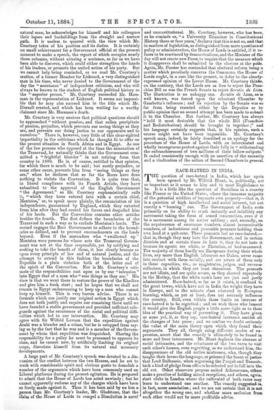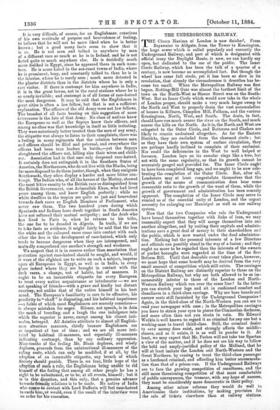RACE-HATRED IN INDIA.
THE question of race-hatred in India, which has again been opened by Mr. Wilfrid Blunt, is, politically, not so important as it seems to him and to most Englishmen to be. It is a little like the question of Socialism in a country like France or the United States, where the immense majority of the potential wielders of bayonets own property—that is, it is a question of high intellectual and social interest, but not exactly a " burning " one. The Government of India rests primarily on its ability to crush instantly and infallibly any movement taking the form of armed insurrection, even if it be a movement among its native soldiery ; and, secondly, on the acquiescence of enormous numbers, almost inconceivable numbers, of industrious and peaceable peasants holding their own land at a quit-rent. These peasants feel no race-hatred,- that is, though they may hate the Government, and in certain districts and at certain times do hate it, they do not hate it because its agents are white, or Christian, or bad-mannered. The majority of them hardly see Europeans during their whole lives, any more than English labourers see Dukes, never come into contact with them socially, and are aware of them only in those capacities, viz., as magistrates, judges, and revenue collectors, in which they are least obnoxious. The peasants are not idiots, and are quite aware, as they showed repeatedly in the Mutiny, that the white men's laws are just and justly administered. Race-hatred, so far as it exists, is confined to the great towns, which have not in India the weight they, have in Europe, and to the minute class educated in European learning, which, as yet at least, does not seriously influence the country. Still, even within those limits an increase of race-hatred is to be regretted ; and we wish those who lament it would give the English people a little more light as to their idea of the practical way of preventing it. They have given us none yet, if, as they say, race-hatred increases amidst all the changes of late years ; and we confess we doubt seriously the value of the main theory upon which they found their arguments. They all, though using different modes of ex- pression, assert that the remedy is ultimately to be found in more and freer intercourse. Mr. Blunt deplores the absence of social intimacies, and the reluctance of the two races to visit each other's houses, even regretting, as we understand him, the disappearance of the old native mistresses, who, though they taught their lovers the language, so poisoned the fount of justice that Lord Dalhousie, when organising the Punjab and Burmah, took a kind of pledge from officers he selected not to fall into the old rut. Other observers propose united Ithenseums, others make a practice of holding mixed receptions, and others, again, start clubs in London where the cultivated of both races may learn to understand one another. The remedy auggestedie, in fact, more association ; and we are not certain that it ia not altogether the wrong one, and whether more seclusion from each other would not be more profitable advice. It is very difficult, of course, for an Englishman, conscious of his own rectitude of purpose and benevolence of feeling, to believe that he will not be more liked when he is better known ; but a good many facts seem to show that it is so. He is not seen and talked to anywhere by men of a different race so much as he is in Ireland, and he is not hated quite so much anywhere else. He is decidedly much more disliked in Egypt, since he appeared there in such num- bers. He is more hated in the sea-coast towns of India, where he is prominent, busy, and constantly talked to, than he is in the interior, where he is rarely seen ; much more detested in the planter districts than in the districts where he is only a rare visitor. If there is contempt for him anywhere in India, it is in the great towns, not in the rural stations where he is so nearly invisible; and contempt is of all forms of race-hatred the most dangerous. It may be said that the Englishman in great cities is often a low fellow, but that is not a sufficient explanation. The officers of the old Army were not low fellows. The broadest of all facts bearing on this suggestion of more intercourse is the fate of that Army. No class of natives knew the Europeans so well as the Sepoys knew their officers, and among no class was that knowledge in itself so little irritating. They were notoriously better treated than the men of any army, the etiquette was always to listen to their complaints, there was a feeling in many regiments that the relation between men and officers should be filial and paternal, and everywhere the officers had been true leaders in battle,—yet the Sepoys slaughtered the officers out, killing also their wives and child- ren. Association had in that case only deepened race-hatred. It certainly does not extinguish it in the Southern States of America, the Northerners, who do not live with the Blacks, being far more disposed to do them justice, though, when they emigrate Southwards, they often display a harder and more bitter con- tempt. The Indian who, of all the heroes of the Mutiny, showed the most bitter enmity to the British race as distinguished from the British Government, was Azimoollah Khan, who had lived years among them, and knew English perfectly ; while no white dwellers in the tropics are quite so just and benevolent towards dark races as English Members of Parliament, who never saw them. The two hundred years during which Spaniards and Indians have dwelt together in South America have not softened their mutual antipathy ; and the Arab who has lived in Paris is, when he returns to his tribe, the one foe to be dreaded in Algeria. In truth, if we are to take facts as evidence, it might fairly be said that the less the white and the coloured races come into contact with each other the less is the development of race-hatred, which only tends to become dangerous when they are interspersed, and mutually comprehend one another's strength and weakness. We suspect that it is in reserve rather than association that protection against race-hatred should be sought, and would, if it were of the slightest use to write on such a subject, impress upon all Europeans in Egypt, as well as in India, in every place indeed where they are brought in contact with the dark races, a change, not of habits, but of manners. It ought to be an inexorable etiquette for every European to treat every native acquaintance or interlocutor — we are not speaking of friends—with a grave and kindly but distant courtesy, not unlike that of the native himself in his best mood. The European's familiarity is sure to be offensive, his proclivity to" chaff" is disgusting, and his habitual impatience —a foible of which most Englishmen are scarcely conscious— is always mistaken for anger. Silence, not speech, is in Asia the mark of breeding, and a laugh the one indulgence into which the superior is never, except among his closest inti- mates, betrayed. Al] Asiatics attribute to almost all English- men atrocious manners, chiefly because Englishmen are so impatient of loss of time ; and we are all more irri- tated by habitual ill-manners, and especially ill-manners indicating contempt, than by any ordinary oppression. Nine-tenths of the feeling Mr. Blunt deplores, and wisely deplores, proceeds from the unintentional ill-manners of the ruling caste, which can only be modified, if at all, by the adoption of an inexorable etiquette, any breach of whioh Society should punish. There is, we fear, little hope of the adoption of such a rule, the Englishman being unable to rid himself of the feeling that among all other people he has a right to be unbuttoned, or to be, at all events, himself ; but it is in Wth. direction, and this only, that a genuine advance towards 'friendly relations is to be made. No native of India who comes in contact with Lord Dufferin will feel race-hatred towards him, ot would, even if the result of the interview were an order for his execution.



































 Previous page
Previous page